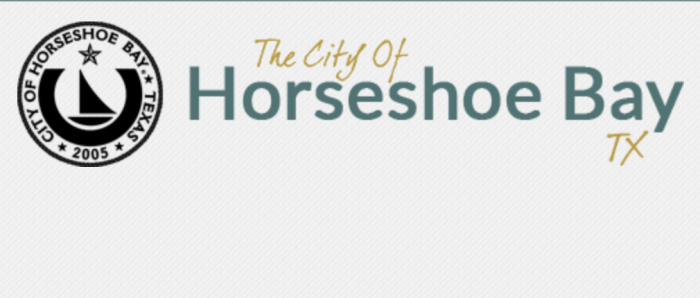HSB reviewing fiscal year 2019 budget

By Lew K. Cohn
Managing Editor
The Highlander
Horseshoe Bay City Council members are expected to propose the same tax rate as last year at their Tuesday, July 17, council meeting after holding a budget workshop the day before.
City Manager Stan Farmer said the proposed fiscal year 2019 budget assumes a general fund operations and management rate of 21.877 cents per $100 valuation and a debt service — or interest and sinking — rate of 4.123 cents for a total rate of 26 cents, which is the current total tax rate for fiscal year 2018. It also assumes a collections rate of 98 percent, which matches the historical average for the city.
Council members must propose a maximum tax rate on July 17, but while they cannot adopt one higher than the maximum proposed, they can adopt a tax rate lower than the one proposed when the formal tax rate is approved in September.
Farmer said he and his staff had one main goal in mind when proposing a budget for fiscal year 2019 — meeting all needs of the general fund without a deficit.
On Monday, Farmer presented a draft of the proposed fiscal year 2019 budget to council members which includes a three-percent salary increase and correlating FICA and retirement increases for city staff (which would cost the city an extra $187,750) as well as a projected 12-percent increase in health care costs (an additional $103,750).
Farmer noted these are conservative estimated increases and are to serve as a placeholder so the council can “get a better feel in July where the budget stands.” The council may adjust the budget as it sees fit.
The proposed budget must be officially filed with the city secretary no later than Aug. 17 this year — 30 days prior to the council passing the official tax levy on Sept. 18.
Farmer said this year, staff prepared five-year revenue and expenditure projections for the general and utilities funds, which should serve as a tool to help the council make decisions affecting the city's short-term and long-term financial goals.
The budget is based on a preliminary Horseshoe Bay taxable valuation of $2,053,035,658 — an increase of $124,324,413 in taxable value over values from last year. The portion of Horseshoe Bay in Llano County has the lion's share in taxable value at $1,846,492,473, with the Burnet County side's taxable value at $206,543,185.
Actual certified values will not be provided from both counties by statute until July 25, however, so the valuations and projected revenues that will be generated could change, Farmer noted.
In the utility fund, the city is proposing a three-percent water and sewer rate increase, which should generate an additional $100,000 in revenue on the water side and $60,000 in revenue on the sewer side.
Also proposed is a three-percent increase in the city's garbate rate, which would match a three-percent cost increase in the city's waste collection contract scheduled for fiscal year 2019.
Farmer did note there are two proposed capital projects not included in the draft version of the budget. The first is a Live Fire Training Facility project proposed by the Horseshoe Bay Fire Department, while the second is an Informational Technology Enterprise Solutions project.
Farmer said adding the two projects to the budget would create a deficit for fiscal year 2019, though the city is projected to have $2,697,688 remaining in unencumbered general fund balance at the end of the next fiscal year. The council was to hear presentations on both projects Monday.
Fire Chief Joe Morris said a Strength, Weakness, Opportunity and Threat (SWOT) analysis of the Horseshoe Bay Fire Department indicated one major weakness of the department is an inability to train firefighters in a live fire environment.
Morris suggested a strategic plan with three possible options, with the first being to continue as is with current training practices. The second is to spend $40,620 annually to send firefighters to a rented facility for live fire training in the Austin area, while the third is to spend $137,000 to build a live fire training facility in Horseshoe Bay that could also be used by other area departments who have mutual aid agreements with Horseshoe Bay.
“It is my belief that building a live fire training facility in Horseshoe Bay is not only the most fiscally responsible option, it also provides the highest level of preparedness for the fire department,” Morris said in his documentation to city officials.
A multi-departmental Technology Research and Development Committee (TRDC) began meeting in February 2018 to develop a strategic five-year plan to address the city's technology issues.
The committee is suggesting the city look into an enhanced enterprise software solution which would incorporate all city departments (Finance, HR, Payroll, Utility Billing, Asset Management and Permitting) instead of using existing fragmented systems which do not necessarily communicate with each other.
Onsite servers and systems would migrate to a cloud-based host, giving the city greater mobile accessibility to applications and data, according to the committee's recommendation. It is believed the new system would result in increased productivity, enhanced efficiency, improved customer service and savings in time and resources while promoting collaboration across all departments.
The cost up front for the first two years for this enterprise system is expected to be about $200,000, which includes $130,000 for initial installation, configuration and project management costs and $65,000 in annual enterprise software subscriptions.

